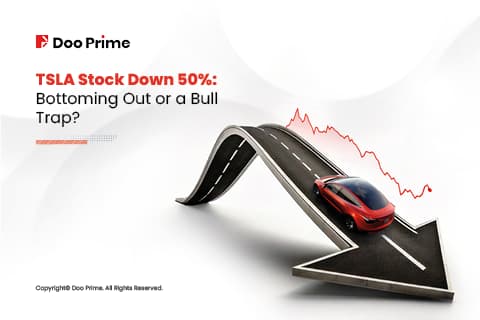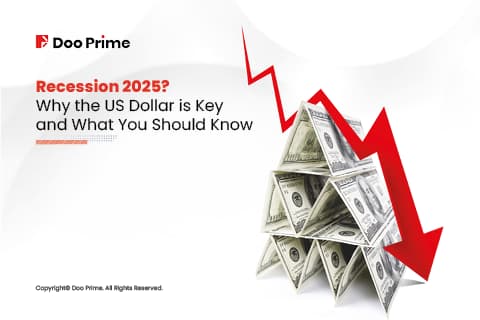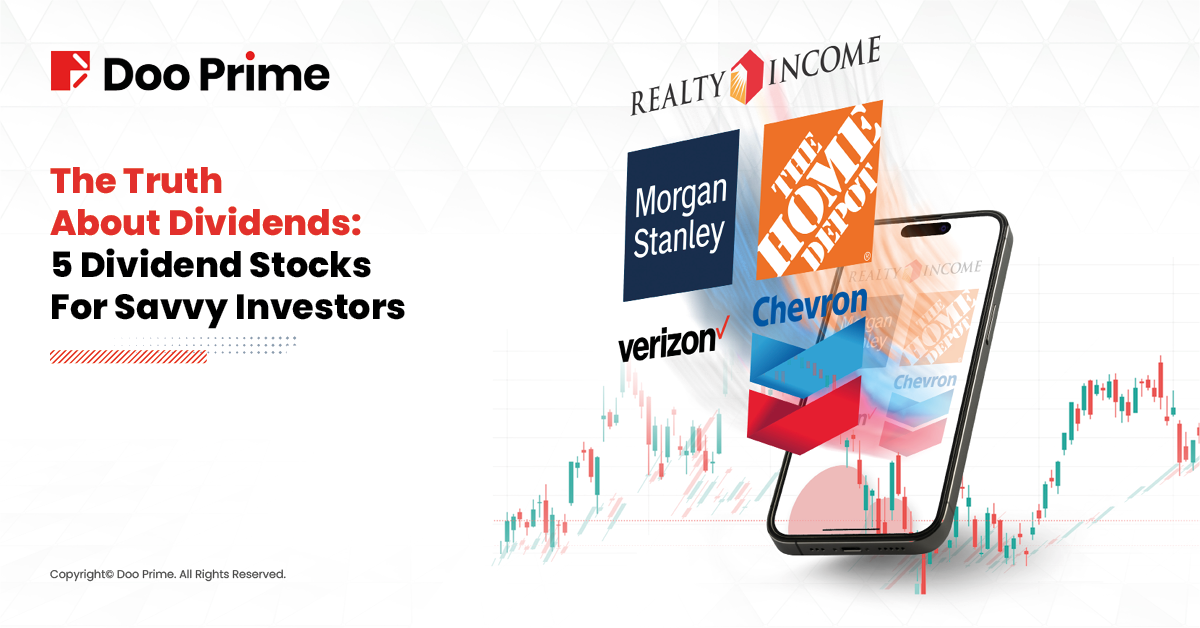
Passive income through dividends is not just a financial strategy; it’s a tried-and-true investment approach that has stood the test of time. In an ever-changing market, the reliability of dividends from carefully selected stocks provides investors with a stable foundation for building wealth.
Before diving into the world of dividend stocks, it’s crucial to understand the landscape. Unlike traditional stock investments where the primary focus is on capital appreciation, dividend investors seek companies that share a portion of their profits with shareholders through regular cash payments.
This article aims to dissect five exceptional companies that stand out for their robust dividend history, promising growth potential, and commitment to shareholder value.
5 Dividend Stocks For Passive Income
Here are five companies with a history of consistent dividend payments across different industries that could be considered for a diversified dividend portfolio:
1. Home Depot (HD)
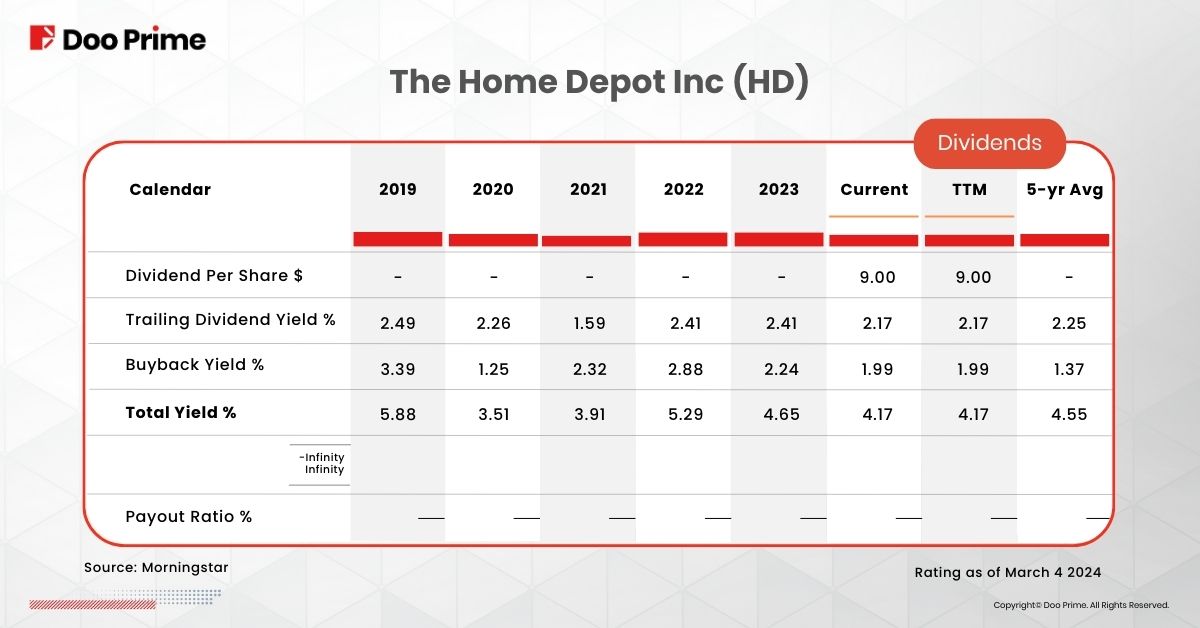
Home Depot stands out as a trailblazer in the home improvement retail sector, with a dominant market position in the United States and a remarkable legacy of success. For over ten years, they’ve consistently rewarded shareholders with reliable dividend payments, demonstrating their commitment to creating long-term value. Their healthy balance sheet and strategic investments in e-commerce further solidify their position for future growth.
Beyond recent performance, Home Depot’s historical success cannot be ignored. Since its IPO, shares have experienced an astronomical return of over 3,000,000%, solidifying their reputation as a wealth-generating powerhouse for long-term investors.
Home Depot is a stellar dividend stock, having consistently raised their payout for 14 consecutive years. Their manageable payout ratio of 46% of cash flow indicates ample room for continued dividend increases in the future. The impressive 15% average increase in dividends over the past five years further underscores their dedication to shareholder value.
Financial Metrics
Currently, Home Depot offers a dividend yield of approximately 2.21%, slightly lower than the 2.41% seen in 2023. The current dividend per share (DPS) stands at USD 9 (annualized). While the yield has experienced some fluctuation, looking at its historical chart reveals a pattern of stability, suggesting a commitment to consistent growth.
2. Morgan Stanley (MS)
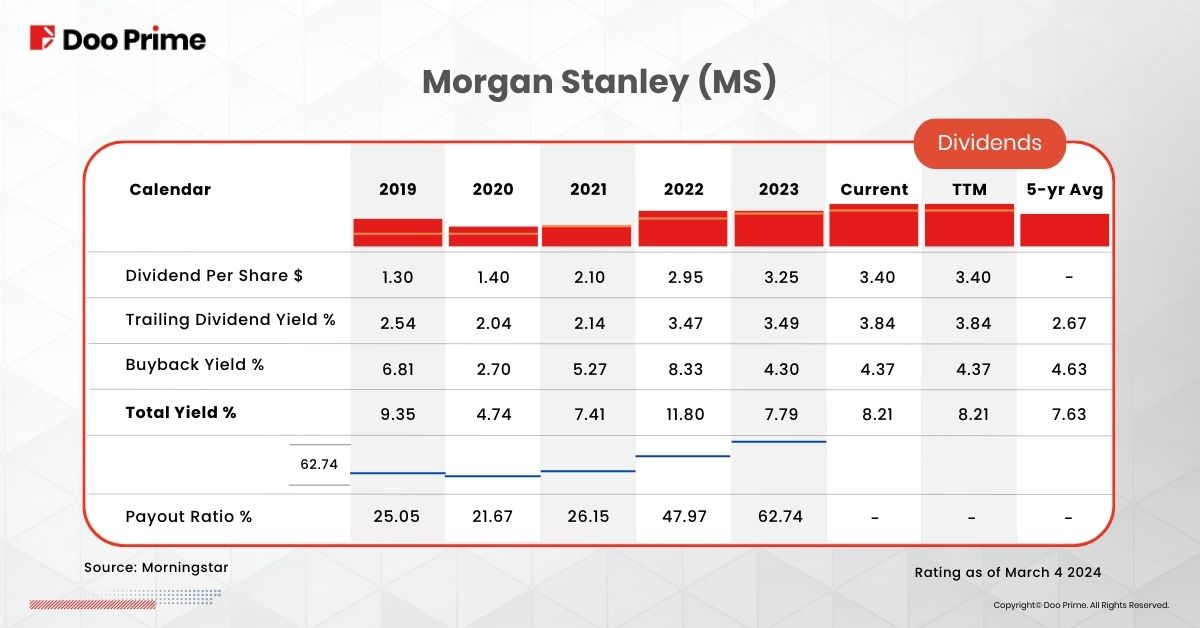
Morgan Stanley (MS) stands as a pillar of the financial services industry, boasting a long and distinguished history of dividend payments. With a diversified business model encompassing investment banking, wealth management, and asset management, they cater to a wide range of financial needs.
Since 1986, Morgan Stanley has maintained a consistent record of dividend payments, further solidifying their reputation as a reliable income source for investors. This commitment extends to quarterly dividend distributions and a remarkable streak of annual dividend increases since 2010. This consistency has earned them the coveted title of “Dividend Achiever,” a designation reserved for companies demonstrating a minimum of 10 consecutive years of dividend growth.
Financial Metrics
Beyond their impressive dividend history, Morgan Stanley boasts a strong financial foundation. They currently offer a solid dividend yield of approximately 3.4%, with a dividend per share of USD 3.40 (annualized). Examining their historical dividend chart reveals a pattern of both high yield and consistent growth, indicating their dedication to shareholder returns alongside financial stability.
3. Realty Income (O)
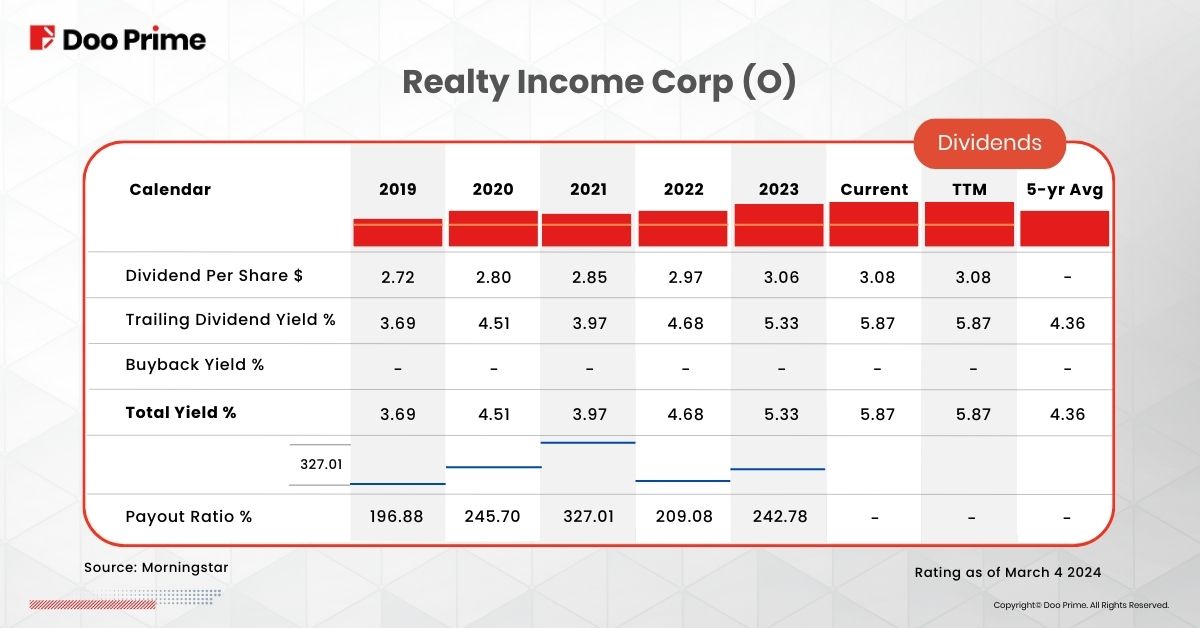
Unlike other companies on the list, Realty Income is a Real Estate Investment Trust (REIT). This unique structure means they invest in income-generating real estate, but instead of directly managing it, they lease it to tenants and distribute at least 90% of their income as dividends. This allows investors to benefit from the stability and potential growth of real estate without the hassle of ownership and management.
Realty Income strategically focuses on single-tenant retail properties occupied by resilient businesses like grocery stores, convenience stores, and pharmacies, making them less vulnerable to e-commerce disruption. These “recession-proof” businesses cater to essential needs, ensuring steadier cash flow even during economic downturns. Notable tenants include Walgreens, Dollar General, Walmart, and Tractor Supply.
Financial Metrics
For income seekers, Realty Income offers a compelling story. They boast a remarkable 53-year track record of increasing dividends, currently yielding approximately 5.9%, which is significantly higher than the average S&P 500 stock. Their historical data reveals a stable and growing dividend yield, showcasing their commitment to shareholder returns.
Financially, they maintain a healthy balance sheet with low debt, ensuring stability and the ability to sustain dividends. Additionally, their projected Adjusted Funds From Operations (AFFO) is projected to be around USD 4.00 based on company guidance, exceeding their current dividend payout, indicating a well-covered dividend and potential for future increases.
4. Verizon (VZ)
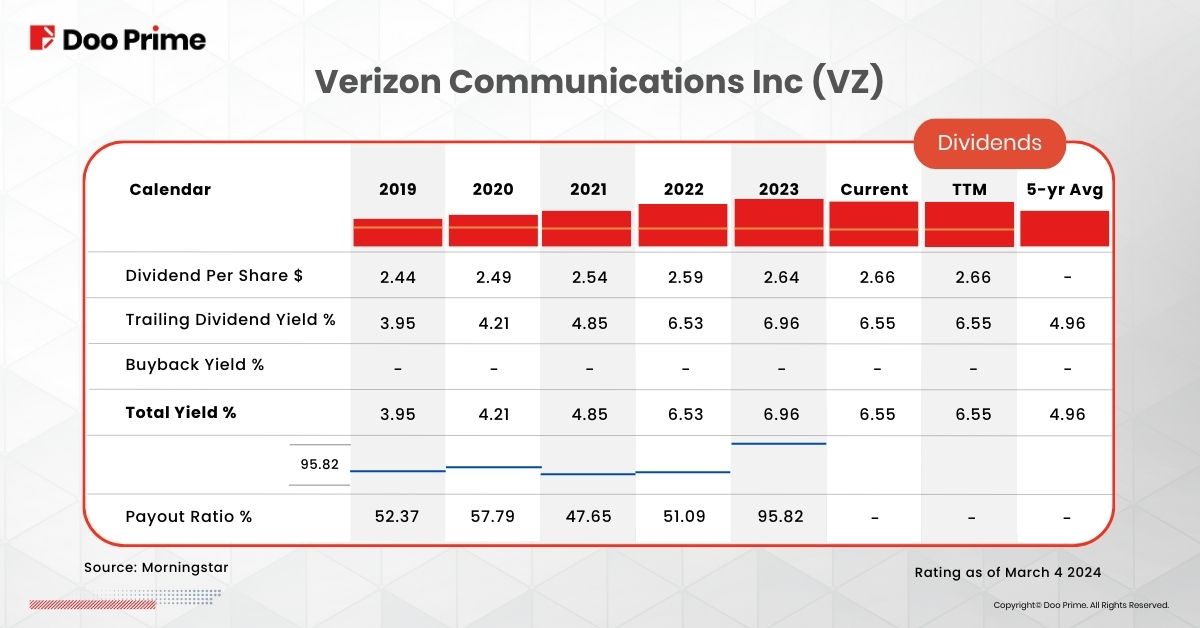
As of now, Verizon boasts the highest dividend yield in the Dow, solidifying its position as a leading telecommunications company with a dominant market share in the United States. With a remarkable track record of consistent dividend payments exceeding 15 years, Verizon stands out as a reliable choice for investors seeking stability and income.
Moreover, Verizon’s low cyclicality is a significant advantage. The essential nature of phone and internet services makes them indispensable for individuals and businesses alike.
Financial Metrics
Verizon’s commitment to shareholders is demonstrated by its current quarterly dividend of USD 0.67 per share, which translates to an attractive annual payout of USD 2.66. Currently, the stock offers a compelling yield of 6.57%. Historically, Verizon’s chart (2014 onwards) reveals both a high yield and consistent growth, making it an attractive option for income-seeking investors.
Looking ahead, Verizon projects adjusted earnings per share (EPS) in the range of USD 4.50 to USD 4.70 for fiscal 2024. This suggests a manageable payout ratio of approximately 58%. The moderate payout ratio not only signifies financial prudence but also grants Verizon considerable flexibility in the face of unexpected challenges. This financial resilience positions the company well for potential future increases in dividends, reflecting a positive outlook for income-seeking investors.
5. Chevron (CVX)
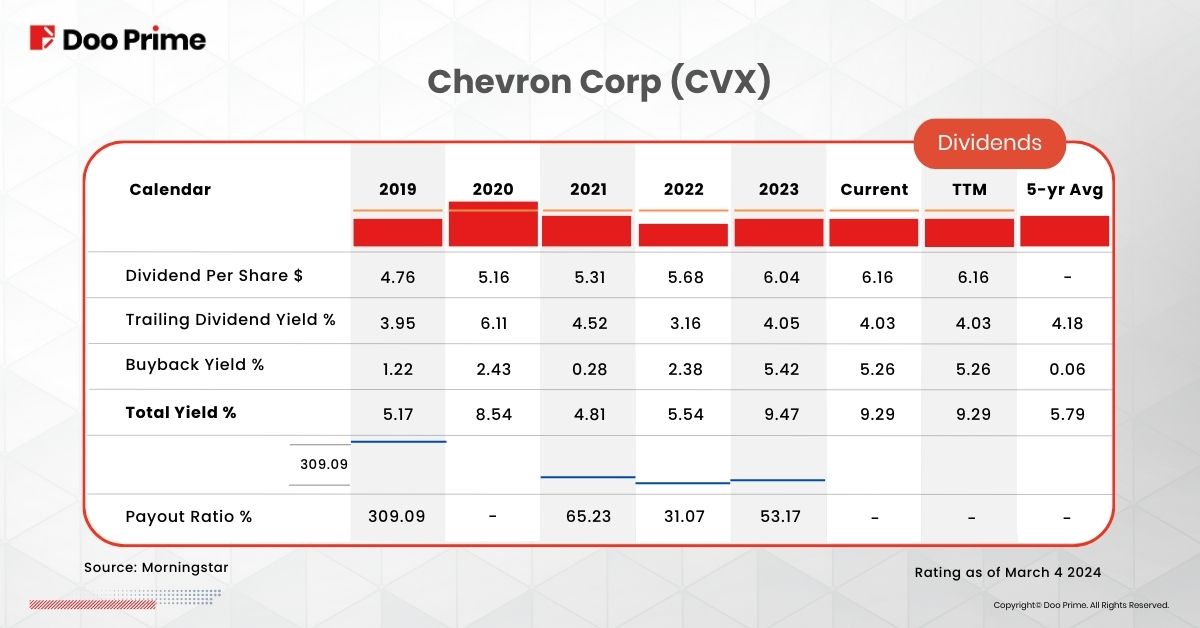
Chevron holds a prominent position as a major oil and gas company, offering a high dividend yield exceeding 3.5%. However, it’s crucial to acknowledge that the oil and gas industry is inherently exposed to fluctuations in oil prices, adding on a layer of risk.
Despite the industry’s volatility, Chevron boasts a remarkable track record of dividend payments. They have increased their payout annually for an impressive 37 consecutive years, marking the second-longest streak within the oil sector.
Beyond the consistent payouts, Chevron’s dividend growth rate elevates its investment potential. The company has consistently delivered above-average payout growth over the past five years, even with a high yield of 4.3%. This performance suggests ample room for continued dividend increases at a healthy pace.
Chevron’s financial strength manifests in their generous shareholder returns. In 2023, they returned a record-breaking USD 26 billion to shareholders, with USD 11.3 billion distributed through dividends and USD 14.9 billion allocated to stock buybacks. This 32% increase in buybacks compared to 2022 demonstrates their commitment to shareholder value, even while increasing the per-share dividend by 6% and maintaining total cash outlays for dividends only 3% above 2022’s total.
Financial Metrics
Currently, Chevron offers a compelling dividend yield of 4.14%. The dividend per share stands at USD 1.63 (annualized at USD 6.16). While the yield has experienced fluctuations over the years, particularly with a surge post-pandemic, it has generally returned to its historical average.
Warning Signs In The Dividend Jungle
While the allure of high-yield stocks is undeniable, it’s crucial to approach them with caution. Double-digit yields often come with significant risks. Extensive research is essential before investing in such companies. Here are some red flags to watch out for:
- Unsustainable payout ratio: The payout ratio compares the amount of dividends a company pays out to its net income. A ratio exceeding 100% indicates the company is paying out more in dividends than it earns, which is unsustainable in the long run.
- Rapidly increasing debt: Companies that rely heavily on debt to maintain their dividend payments are at risk of defaulting if their financial performance weakens.
- Declining earnings: A company with consistently declining earnings may struggle to maintain its dividend payments in the future.
Remember, don’t be solely enticed by high payouts. Prioritize the company’s overall health, financial stability, and long-term growth prospects. A company with a consistent track record of profitability, manageable debt levels, and a sustainable dividend payout ratio is likely to be a more reliable and secure investment.
Risk Disclosure
Trading in financial instruments involves high risks due to the fluctuation in the value and prices of the underlying financial instruments. Due to the adverse and unpredictable market movements, large losses exceeding the investor’s initial investment could incur within a short period of time. The past performance of a financial instrument is not an indication of its future performance. Investments in certain services should be made on margin or leverage, where relatively small movements in trading prices may have a disproportionately large impact on the client’s investment and client should therefore be prepared to suffer significant losses when using such trading facilities.
Please make sure you read and fully understand the trading risks of the respective financial instrument before engaging in any transaction with Doo Prime’s trading platforms. You should seek independent professional advice if you do not understand any of the risks disclosed by us herein or any risk associated with the trade and investment of financial instruments. Please refer to Doo Prime’s Client Agreement and Risk Disclosure and Acknowledgement Notice to find out more.
Disclaimer
This information is addressed to the general public solely for information purposes and should not be taken as investment advice, recommendation, offer, or solicitation to buy or sell any financial instrument. The information displayed herein has been prepared without any reference or consideration to any particular recipient’s investment objectives or financial situation. Any references to the past performance of a financial instrument, index, or a packaged investment product shall not be taken as a reliable indicator of its future performance. Doo Prime and its holding company, affiliates, subsidiaries, associated companies, partners and their respective employees, make no representation or warranties to the information displayed and shall not be liable for any direct, indirect, special or consequential loss or damages incurred a result of any inaccuracies or incompleteness of the information provided, and any direct or indirect trading risks, profit, or loss arising from any individual’s or client’s investment.

